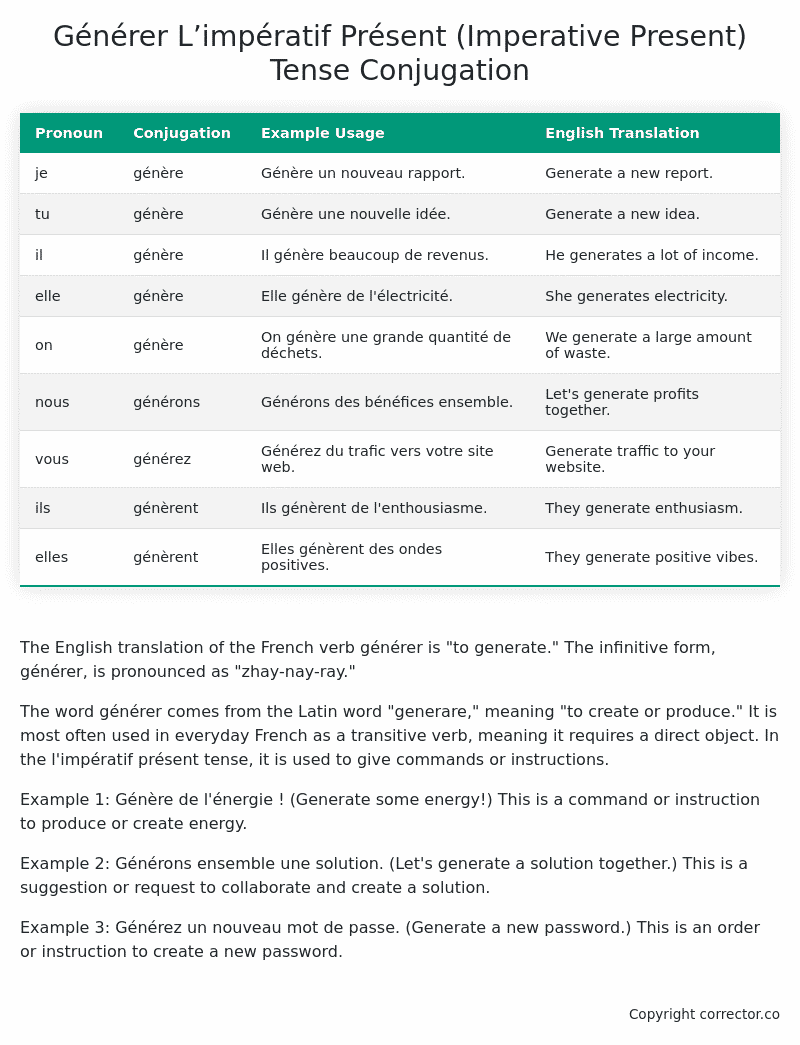L’impératif Présent (Imperative Present) Tense Conjugation of the French Verb générer
Introduction to the verb générer
The English translation of the French verb générer is “to generate.” The infinitive form, générer, is pronounced as “zhay-nay-ray.”
The word générer comes from the Latin word “generare,” meaning “to create or produce.” It is most often used in everyday French as a transitive verb, meaning it requires a direct object. In the l’impératif présent tense, it is used to give commands or instructions.
Example 1:
Génère de l’énergie ! (Generate some energy!)
This is a command or instruction to produce or create energy.
Example 2:
Générons ensemble une solution. (Let’s generate a solution together.)
This is a suggestion or request to collaborate and create a solution.
Example 3:
Générez un nouveau mot de passe. (Generate a new password.)
This is an order or instruction to create a new password.
Table of the L’impératif Présent (Imperative Present) Tense Conjugation of générer
| Pronoun | Conjugation | Example Usage | English Translation |
|---|---|---|---|
| je | génère | Génère un nouveau rapport. | Generate a new report. |
| tu | génère | Génère une nouvelle idée. | Generate a new idea. |
| il | génère | Il génère beaucoup de revenus. | He generates a lot of income. |
| elle | génère | Elle génère de l’électricité. | She generates electricity. |
| on | génère | On génère une grande quantité de déchets. | We generate a large amount of waste. |
| nous | générons | Générons des bénéfices ensemble. | Let’s generate profits together. |
| vous | générez | Générez du trafic vers votre site web. | Generate traffic to your website. |
| ils | génèrent | Ils génèrent de l’enthousiasme. | They generate enthusiasm. |
| elles | génèrent | Elles génèrent des ondes positives. | They generate positive vibes. |
Other Conjugations for Générer.
Le Present (Present Tense) Conjugation of the French Verb générer
Imparfait (Imperfect) Tense Conjugation of the French Verb générer
Passé Simple (Simple Past) Tense Conjugation of the French Verb générer
Passé Composé (Present Perfect) Tense Conjugation of the French Verb générer
Futur Simple (Simple Future) Tense Conjugation of the French Verb générer
Futur Proche (Near Future) Tense Conjugation of the French Verb générer
Plus-que-parfait (Pluperfect) Tense Conjugation of the French Verb générer
Passé Antérieur (Past Anterior) Tense Conjugation of the French Verb générer
Futur Antérieur (Future Anterior) Tense Conjugation of the French Verb générer
Subjonctif Présent (Subjunctive Present) Tense Conjugation of the French Verb générer
Subjonctif Passé (Subjunctive Past) Tense Conjugation of the French Verb générer
Subjonctif Imparfait (Subjunctive Imperfect) Tense Conjugation of the French Verb générer
Subjonctif Plus-que-parfait (Subjunctive Pluperfect) Tense Conjugation of the French Verb générer
Conditionnel Présent (Conditional Present) Tense Conjugation of the French Verb générer
Conditionnel Passé (Conditional Past) Tense Conjugation of the French Verb générer
L’impératif Présent (Imperative Present) Tense Conjugation of the French Verb générer (this article)
L’infinitif Présent (Infinitive Present) Tense Conjugation of the French Verb générer
Struggling with French verbs or the language in general? Why not use our free French Grammar Checker – no registration required!
Get a FREE Download Study Sheet of this Conjugation 🔥
Simply right click the image below, click “save image” and get your free reference for the générer L’impératif Présent tense conjugation!

Générer – About the French L’impératif Présent (Imperative Present) Tense
Usage
Giving commands
Making requests
Offering advice
Expressing desires
Conjugation Formation
Interactions with other tenses
Want More?
I hope you enjoyed this article on the verb générer. Still in a learning mood? Check out another TOTALLY random French verb conjugation!


